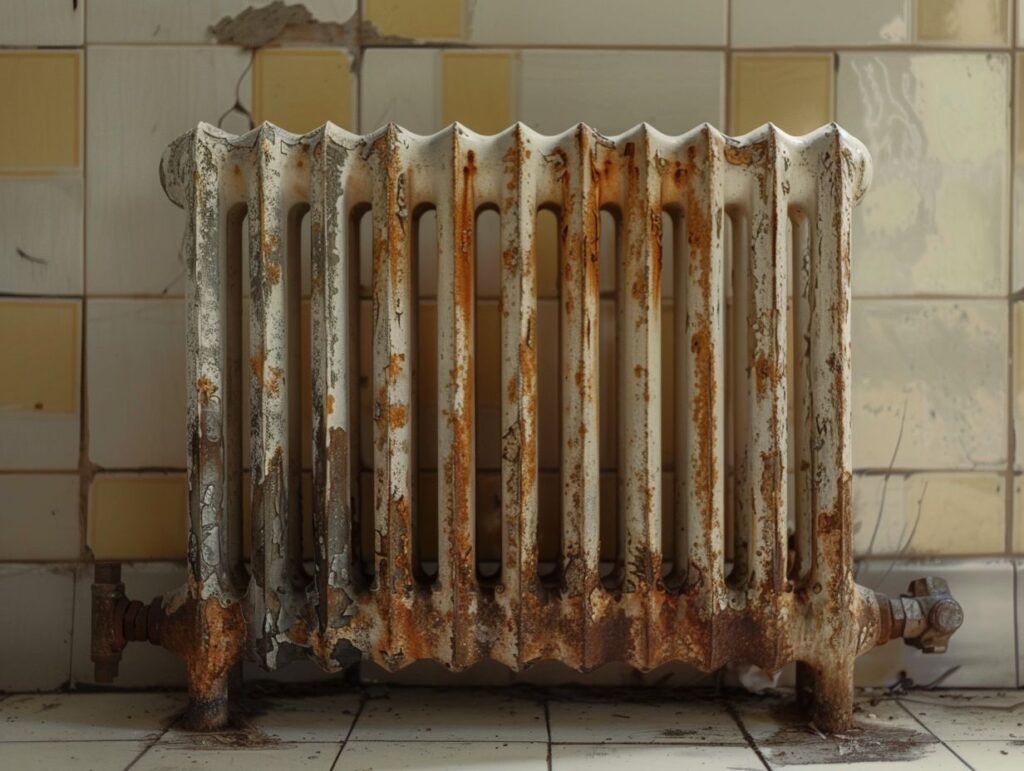Kitchen radiators are an essential component of any kitchen, offering warmth and comfort. As time goes by, these radiators may become susceptible to rust, impacting their visual appeal and functionality.
In the following discussion, you will explore the various types of kitchen radiators, identify the causes of rust, recognize warning signs, implement preventative measures, and learn how to address rust if it arises. Keep reading to enhance your understanding of maintaining your kitchen radiators in optimal condition.
Key Takeaways:
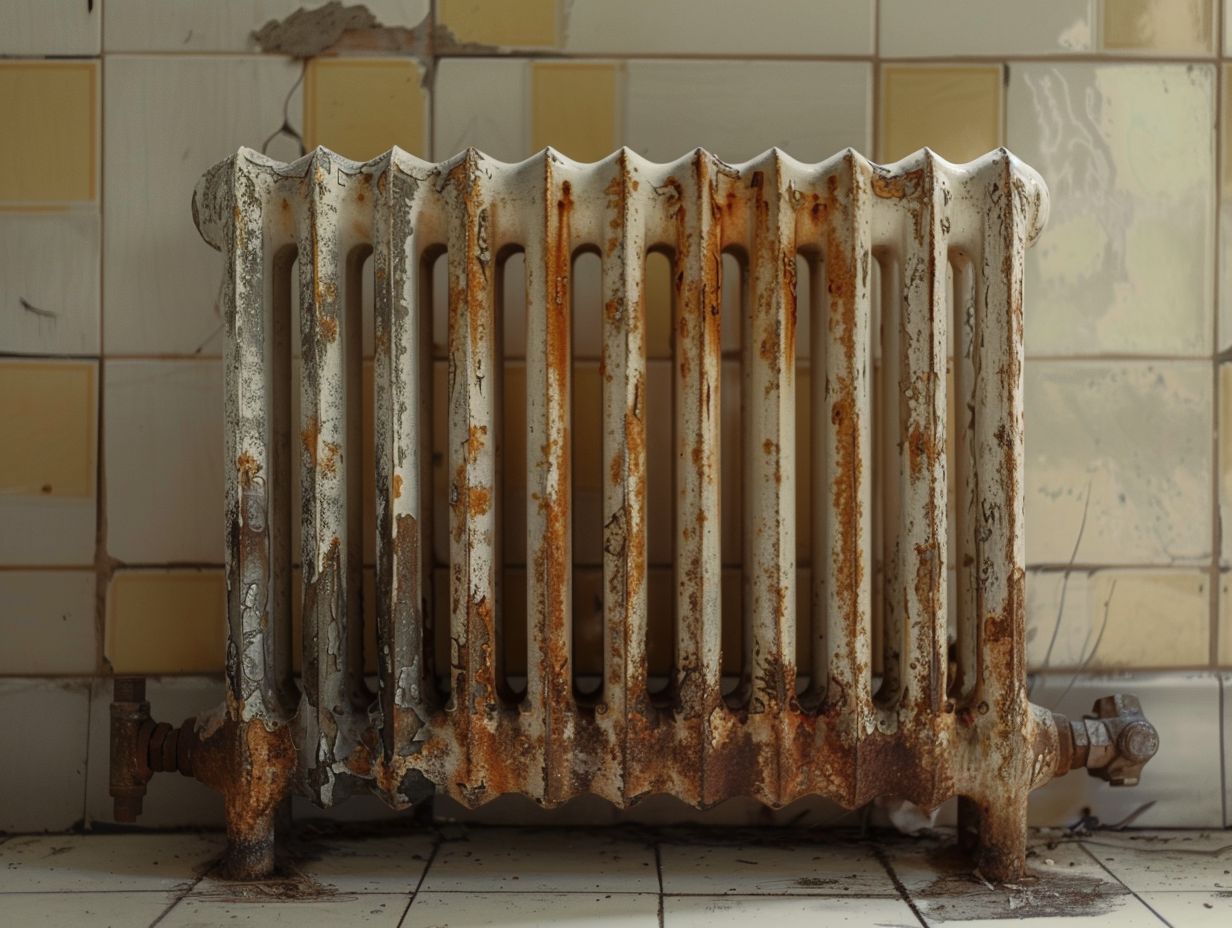
- Kitchen radiators can rust due to exposure to moisture and air, and the quality of materials used.
- Signs of rust on kitchen radiators include visible rust spots and changes in performance.
- To prevent rust, regular maintenance and cleaning, as well as proper installation and ventilation, are key.
Causes of Rust on Kitchen Radiators
You may notice rust forming on your kitchen radiators, which can be caused by a variety of factors, including exposure to moisture and air. The quality of materials used in the construction of the radiator can also impact the likelihood of rust developing.
When your kitchen radiators are consistently exposed to high levels of humidity, whether from cooking activities or a damp environment, the moisture can penetrate the metal surfaces, hastening the oxidation process.
This, in conjunction with oxygen from the air, creates an optimal setting for the formation of rust. The choice of materials used in the manufacturing of the radiator is also a critical factor; radiators crafted from less expensive, lower-quality materials are more prone to corrosion compared to those made with rust-resistant alloys or protective coatings.
Exposure to Moisture and Air
Moisture and air exposure are critical factors contributing to rust formation on Kitchen Radiators. The presence of water vapour in the air, combined with oxygen, can trigger the corrosion process, particularly in radiators constructed from materials susceptible to rust.
Without adequate ventilation, moisture from the kitchen air can collect on the surface of the radiator, establishing an environment conducive to rust development over time.
While white radiators may be visually appealing, they are particularly prone to corrosion when exposed to moisture and inadequate airflow. To prevent rust, it is essential to maintain proper ventilation in the kitchen.
This facilitates the dispersal of excess moisture and reduces the likelihood of rust forming on the radiator’s surface. Regular maintenance, including cleaning and painting, can establish a protective barrier against corrosion.
Quality of Materials
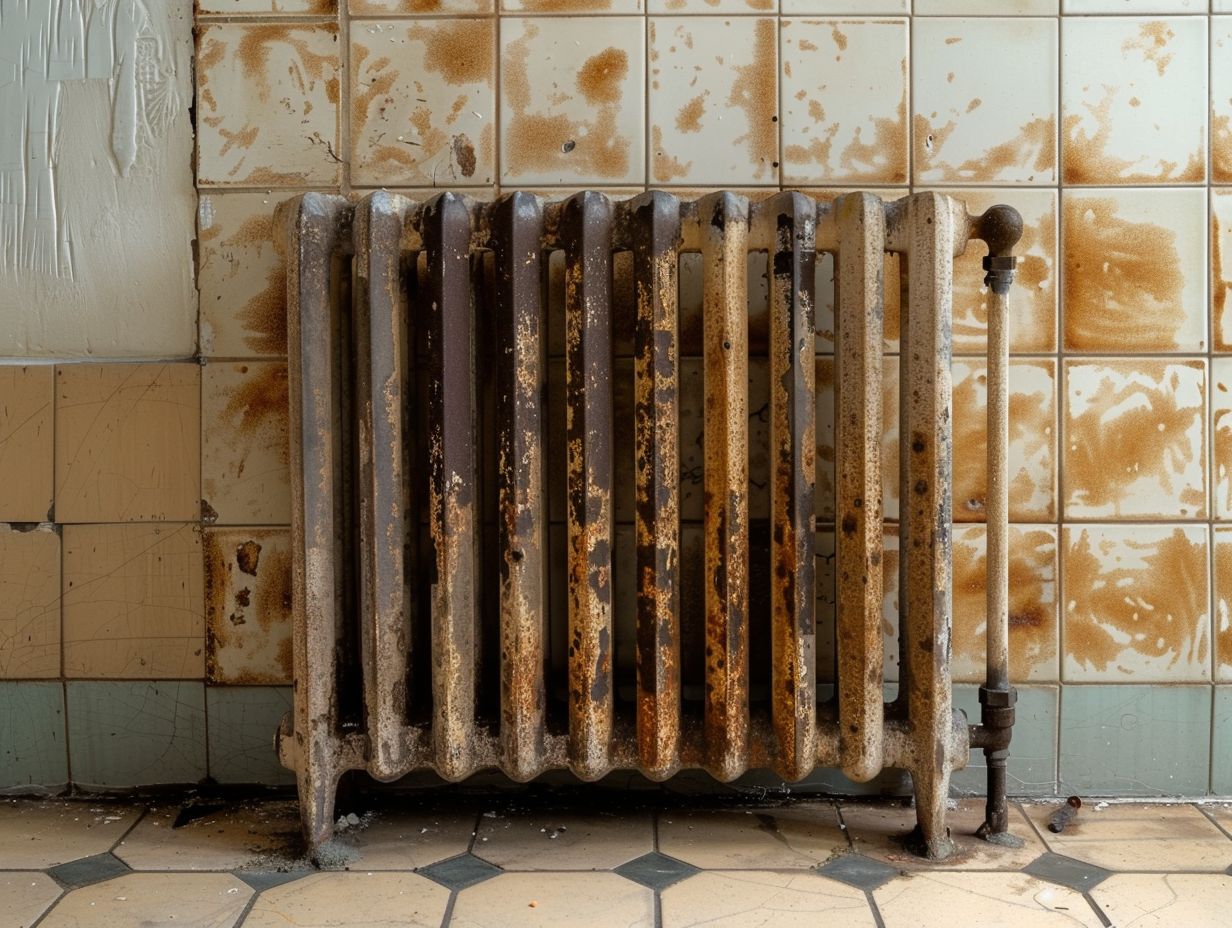
The quality of materials used in Kitchen Radiators significantly impacts their susceptibility to rust and corrosion. Radiators made from certain metals or alloys may be more prone to rusting, especially when exposed to moisture or chemicals.
On the other hand, stainless steel and aluminium radiators are known for their high corrosion resistance, making them ideal choices for kitchens where moisture levels can be higher. These materials are less likely to deteriorate due to sludge build-up, offering longevity and durability.
When selecting a radiator for your kitchen, it’s essential to consider the material composition to ensure its resistance to rust and corrosion. By prioritising quality materials, homeowners can effectively prevent costly issues related to oxidation and maintain a functional and visually appealing kitchen space.
Signs of Rust on Kitchen Radiators
Recognising signs of rust on Kitchen Radiators is essential for timely maintenance and repair. Rust spots on radiators may indicate potential leaks and ongoing corrosion, which, if unaddressed, can result in significant problems with the heating system.
Any unusual noises or variations in heat output should prompt homeowners to arrange a comprehensive inspection.
Regular annual boiler services are crucial for detecting current rust issues and preventing future corrosion through appropriate maintenance procedures. Investing in boiler maintenance can assist homeowners in avoiding expensive repairs and ensuring their heating system functions efficiently and effectively.
Visible Rust Spots
Visible rust spots on your Kitchen Radiators are a clear indication of corrosion occurring within your heating system. These spots may manifest as reddish-brown patches on the radiator surface, signalling the presence of rust and potential damage.
If these rust spots are left unattended, they can lead to significant problems such as leaks or even system failure. To prevent further deterioration and maintain the integrity of your heating system, it is essential to take prompt action.
Seeking assistance from a professional for an annual boiler service can aid in early identification and resolution of any corrosion issues. Implementing corrosion prevention strategies such as the installation of corrosion-resistant radiator valves or utilising inhibitors in the system can help extend the lifespan of your radiators and ensure efficient heating.
Changes in Performance
Changes in the performance of your Kitchen Radiators, such as uneven heating or decreased efficiency, can serve as indicators of underlying issues like sludge buildup or corrosion.
To address these issues and maintain optimal radiator performance, consider installing a radiator inhibitor. Regular cleaning and maintenance are critical for enhancing radiator efficiency.
Flushing the radiator system and incorporating a high-quality inhibitor can help prevent sludge formation and corrosion, thereby ensuring smooth operation of your radiators. Establishing a routine maintenance schedule is essential to prolonging the lifespan of your radiators and maintaining their peak performance.
Plus regular maintenance tasks, such as checking for leaks, inspecting radiator valves, and bleeding air from the system, can further contribute to improved efficiency.
Preventing Rust on Kitchen Radiators
To prevent rust on your kitchen radiators, it is essential to prioritise regular maintenance practices. Utilising methods such as cleaning with white vinegar, utilising tin foil for rust removal, and applying protective coatings can effectively inhibit the formation of rust.
To begin, scheduling routine cleaning sessions is recommended. Create a mixture of equal parts water and white vinegar in a spray bottle and generously apply it to the surfaces of the radiators.
Allow the solution to sit for a few minutes to break down any rust or grime present. Following this, gently scrub the radiator using a ball of crumpled tin foil to eliminate stubborn rust spots without causing any scratches.
Once the cleaning process is complete, it is advisable to consider applying a rust-resistant paint or coating. This additional layer of protection will help safeguard the radiators against moisture and further rust formation, enhancing their longevity and efficiency.
Regular Maintenance and Cleaning
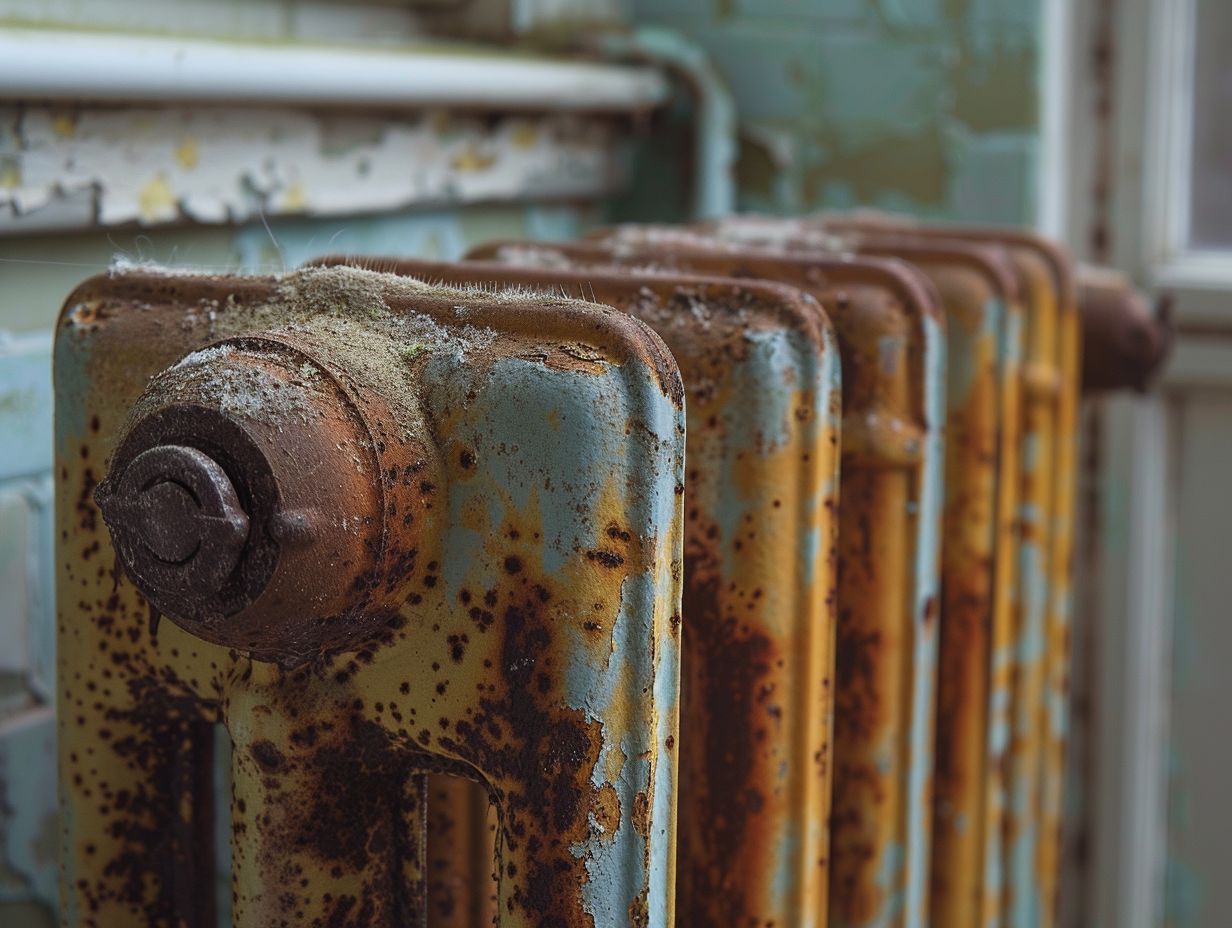
Regular maintenance and cleaning are crucial for preventing rust on your kitchen radiators. Utilising natural solutions like white vinegar for cleaning and tin foil for rust removal can help you maintain the efficiency and appearance of your radiators.
Incorporating regular maintenance practices plays a vital role in extending the life of your kitchen radiators. By preventing corrosion and ensuring optimal performance, you can ensure that your radiators function effectively for years to come.
Simple cleaning routines using household items such as white vinegar can effectively eliminate dirt and mineral build-up. To clean your radiators with white vinegar, follow these steps:
- Dilute white vinegar with water.
- Apply the solution using a cloth.
- Wipe down the radiator surface.
Similarly, using tin foil for rust removal by gently scrubbing affected areas can restore your radiators to a sparkling condition. These natural cleaning agents offer a cost-effective and eco-friendly solution and contribute to a healthier indoor environment by reducing the need for harsh chemicals.
By incorporating preventive cleaning techniques and regular maintenance, you can enjoy efficient and aesthetically pleasing kitchen radiators for years to come.
Proper Installation and Ventilation
Proper installation and ventilation are essential in preventing rust on Kitchen Radiators. Ensuring that radiators are correctly installed, conducting periodic radiator flushing, and repainting radiators when needed can help maintain their structural integrity and prevent corrosion.
Improper installation of radiators can result in the formation of air pockets within the system, leading to corrosion. Regular flushing of radiators helps remove sediment and mineral deposits that could cause rust, ensuring optimal performance and longevity.
Repainting radiators not only improves their aesthetic appeal but also serves as a protective barrier against moisture and oxidation, helping to prevent rust formation. These straightforward maintenance practices are crucial in preserving the efficiency and durability of your radiators.
Dealing with Rust on Kitchen Radiators
When dealing with Rust on Kitchen Radiators, you need to employ effective cleaning and repair methods. Utilising natural solutions like white vinegar, bicarbonate of soda, lemon, and sandpaper can assist in removing rust stains and restoring the radiators to their optimal condition.
The acidic properties of white vinegar make it an excellent choice for dissolving rust, which is why it is commonly used for cleaning metal surfaces. When combined with bicarbonate of soda or lemon juice, you create a powerful rust-fighting mixture. Gently sanding the affected areas can help smoothen out the surface.
It is essential to conduct regular maintenance by inspecting your radiators for any signs of rust and promptly addressing them to prevent further corrosion. By following these strategies, you can ensure that your kitchen radiators remain in top-notch condition for years to come.
Removing Rust and Repairing Damage
When removing rust and repairing damage on kitchen radiators, a meticulous approach is essential. Utilise white vinegar for rust removal, bicarbonate of soda for cleaning, lemon for rust prevention, and sandpaper for surface restoration to effectively address rust issues and restore the radiators.
The subsequent step in this process involves thoroughly rinsing the radiators with water after the application of the natural cleaning agents. This rinsing step ensures the removal of all residue from the cleaning solutions, leaving the radiators clean and free from any harmful chemicals.
Once the radiators are clean and dry, applying a rust-inhibiting primer can further protect them from future rust formation. Regular maintenance is critical to extending the lifespan of the radiators, including checking for any signs of rust and promptly addressing them to prevent further damage.
Replacing Rusty Parts
For long-term functionality, it is crucial to replace rusty parts on kitchen radiators. To improve radiator performance and eliminate rust particles, consider installing a magnetic filter, using a metallic brush for cleaning, and conducting a power flush.
Homeowners can maintain their radiators in top condition by regularly replacing rusty components. The use of a magnetic filter is highly effective in capturing rust particles circulating in the system, preventing further damage.
Cleaning with a metallic brush ensures thorough removal of stubborn rust spots, enhancing heat distribution. Completing the maintenance process with a power flush helps dislodge and remove debris, optimising the efficiency of the radiator system.
Frequently Asked Questions
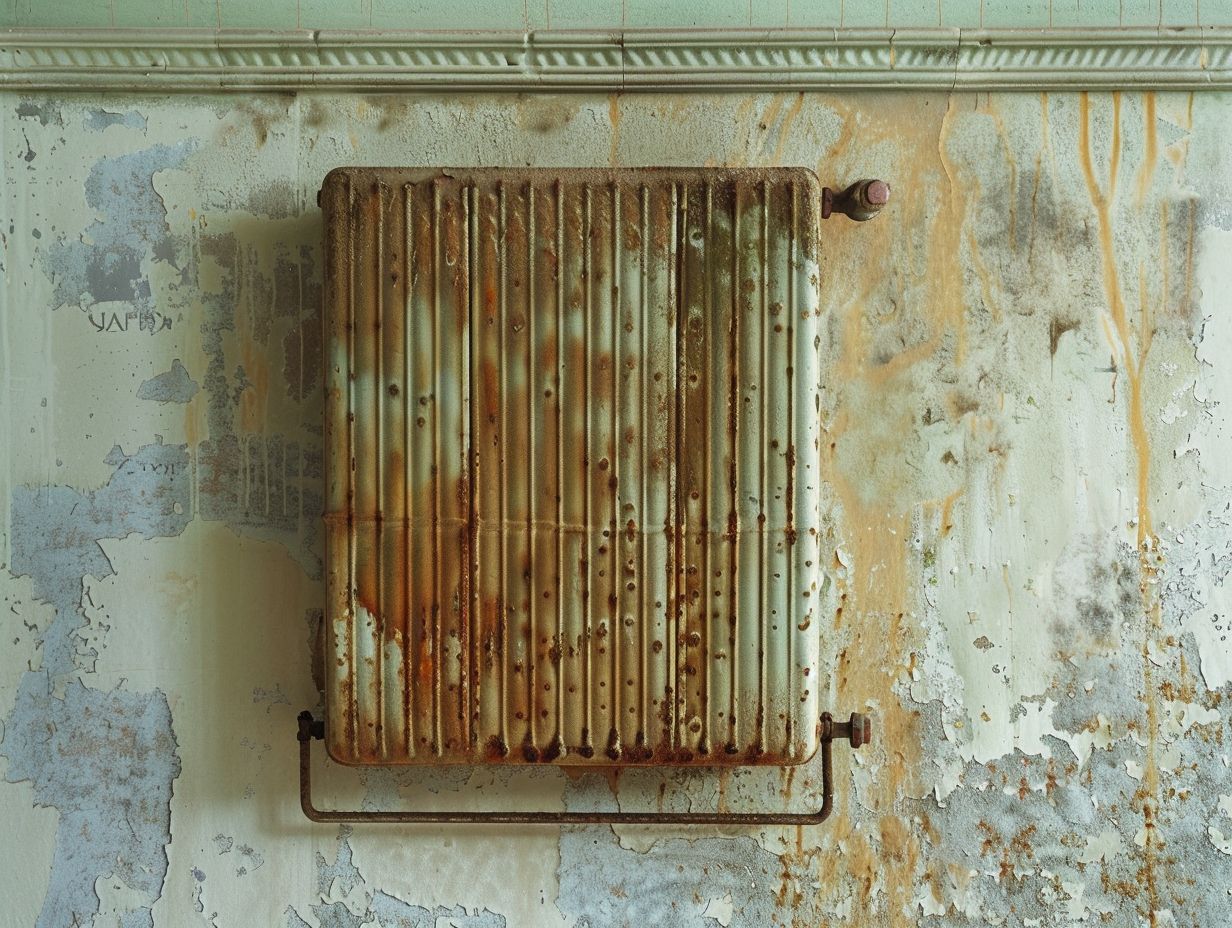
Do kitchen radiators rust?
Yes, kitchen radiators can rust over time. This is due to exposure to moisture and the metal components of the radiator reacting with oxygen in the air.
What causes kitchen radiators to rust?
The main cause of rust on kitchen radiators is exposure to moisture. This can come from steam from cooking, spills, or even high humidity levels in the kitchen.
Can kitchen radiators be prevented from rusting?
While it is difficult to completely prevent kitchen radiators from rusting, there are steps you can take to slow down the process. Regular cleaning and proper ventilation in the kitchen can help prevent moisture build-up.
How can I remove rust from my kitchen radiator?
If your kitchen radiator has already started to rust, there are a few methods you can try to remove it. These include using a mixture of vinegar and baking soda, sanding the rusted area, or using a commercial rust remover.
Can rust on a kitchen radiator be dangerous?
In most cases, rust on a kitchen radiator is not dangerous. However, if the rust is causing the radiator to corrode and leak, it can become a safety hazard. It is important to address any rust on your radiator before it causes significant damage.
When should I replace a rusted kitchen radiator?
If the rust on your kitchen radiator has caused significant damage or is causing leaks, it may be time to replace it. It is important to regularly inspect your radiator for rust and address any issues before they become too severe.

